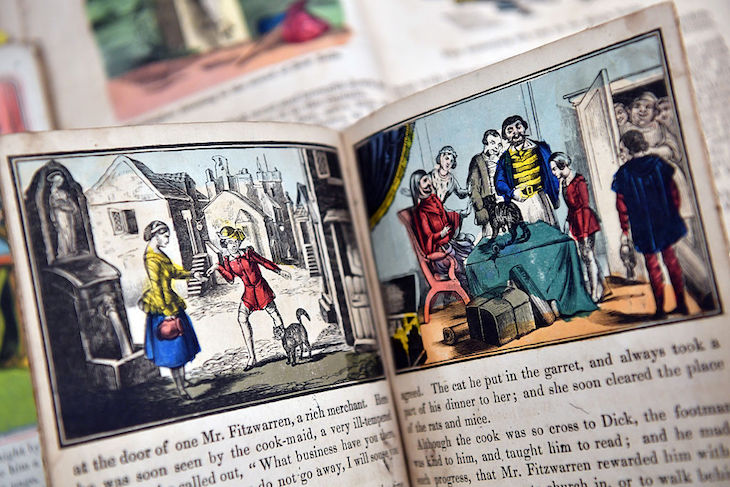Last Christmas I offered you a cruel satire about a boardroom big-shot whose career went so awry that he ended up as a pantomime dame. So perhaps there’s justice in the fact that this year, that’s what’s happened to me. Instead of schmoozing the City’s festive party round, I’m cross–dressing nightly on a Yorkshire stage as Sarah the Cook in Dick Whittington and His Cat.
The original Whittington, four times Lord Mayor of London between 1397 and 1419, was a mercer who exported English cloth across the North Sea, importing silks and velvets in return. But in panto, Dick and his crew turn their backs on our European partners and sail in search of new trade deals ‘on stormy seas where rough winds blow/ to the sandy shore of Moroc-co!’ And when the Good Ship Lollipop sinks, there isn’t even time to ad-lib ‘Talk about a hard Brexit…’ before ‘Women and cooks first!’
Of course every panto has a happy ending. British export excellence wins the day when Dick’s faithful cat Tommy exterminates the rats in the palace of the ‘current Sultana’, who gratefully sends us home in a new ship full of treasure. So the moral of the story is never despair — and have faith in the Fairy, who in our case has something of the vicar’s-daughter voice of Theresa May. Will life imitate art and negotiating chaos give way to joy, prosperity and a glorious finale? As the Sultana says in a different context: ‘Don’t go raisin’ your hopes…’
Best and worst
And so to my annual awards. Best business recovery of 2017: Lloyds Banking Group, which returned from the bailout sin-bin to full membership of the private sector in May. The year’s most lamented collapse: the upmarket Swan Hellenic cruise line in January. And the least lamented? The devil’s own PR firm, Bell Pottinger, in September.
The best business books, by a long chalk, were Till Time’s Last Sand, David Kynaston’s richly entertaining history of the Bank of England; and The Spider Network by David Enrich, which unravels the part played in the Libor scandal by Tom Hayes, the UBS trader who is serving a long stretch for conspiracy to defraud. Prosecutors painted Hayes as the ringmaster of the widespread cheating that infected interbank rate-fixing between 2007 and 2010, hence his sentence of 14 years, later reduced to 11. But Enrich sees him more as the fly in a spider’s web woven by many traders, brokers and their bosses — leaving the reader with a strong sense that justice has not been done.
Where are they now?
As for fiction, my reading this year drew me back to two characters who both made me wonder where they might be today. The first was Nigel Molesworth, ‘the curse of st custard’s’ in Geoffrey Willans’s Down With Skool! and How To Be Topp, illustrated by Ronald Searle. I had not looked at these 1950s classics for half a century until I referred to one of Searle’s cartoons here last month. Molesworth’s vivid if dyslexic turn of phrase suggests he would have made a pretty good tabloid journalist of the sort who ended up doing PR for dangerous Russian oligarchs or concocting scare stories about the EU for the Leave campaign. Meanwhile, his classmate ‘Fotherington-Tomas’, who was ‘uterly wet and… kepes dollies at home’, might have made a career in the BBC and wept at last year’s referendum result — but found consolation in a peerage and the headship of an Oxbridge college.
The other fictional creature who reclaimed my attention was Patrick Bateman, the serial-killer protagonist of Bret Easton Ellis’s 1991 novel American Psycho. Bateman was a Wall Street banker whose lifestyle caricatured everything that was repulsive about the late-1980s boom — and who idolised Donald Trump, craving to be invited to his parties. If Bateman had evaded justice he would have made a billion by now, but (according to Ellis himself) he would have hated Trump’s populist campaign-trail embrace of blue-collar America. Now that the President has reverted to favouring the rich, sneering at minorities and preening at his own good fortune, I think Bateman would be back onside — and probably roaming the White House corridors.
Farewell
At this season I always review the lists of business folk who have been called to the great departure lounge during the year. Rogueishness was certainly well represented, inter alia, by the Tory MP turned Lonrho chairman Sir Edward du Cann, who seemed to have stepped out of a Simon Raven novel, and Freddy Shepherd, the Newcastle United chairman who was filmed in a Spanish brothel saying ‘Newcastle girls are dogs.’ The richest to leave us was 94-year-old L’Oréal heiress Liliane Bettencourt, whose scandal-ridden decline illustrated all the misfortunes of extreme wealth. The oldest, at 101, was the princely banker David Rockefeller, whose well-spent life illustrated very much the opposite. ‘Most missed’ is perhaps too subjective a category, but one who certainly died too young and left the world a duller place was that entrepreneurial friend of The Spectator Sir David Tang.
Letters please
The greatest pleasure of this column is the informative and bracing correspondence it provokes from readers. You were particularly lively in response to my restaurant tips from France over the summer, so we shall certainly have more of those. And I even enjoyed a letter that said: ‘Your column is beyond the pale… Grow up. Your great predecessor, Christopher Fildes, would be ashamed of you.’ I trace my career in journalism to a vintage postcard (‘London County Council Tramways No. 1753’) from Christopher offering to help me get started, and I’m sure he’ll send another if I transgress. Meanwhile, I wish him on your behalf, and all of you, a very happy Christmas. Do keep writing: martin@spectator.co.uk.







Comments